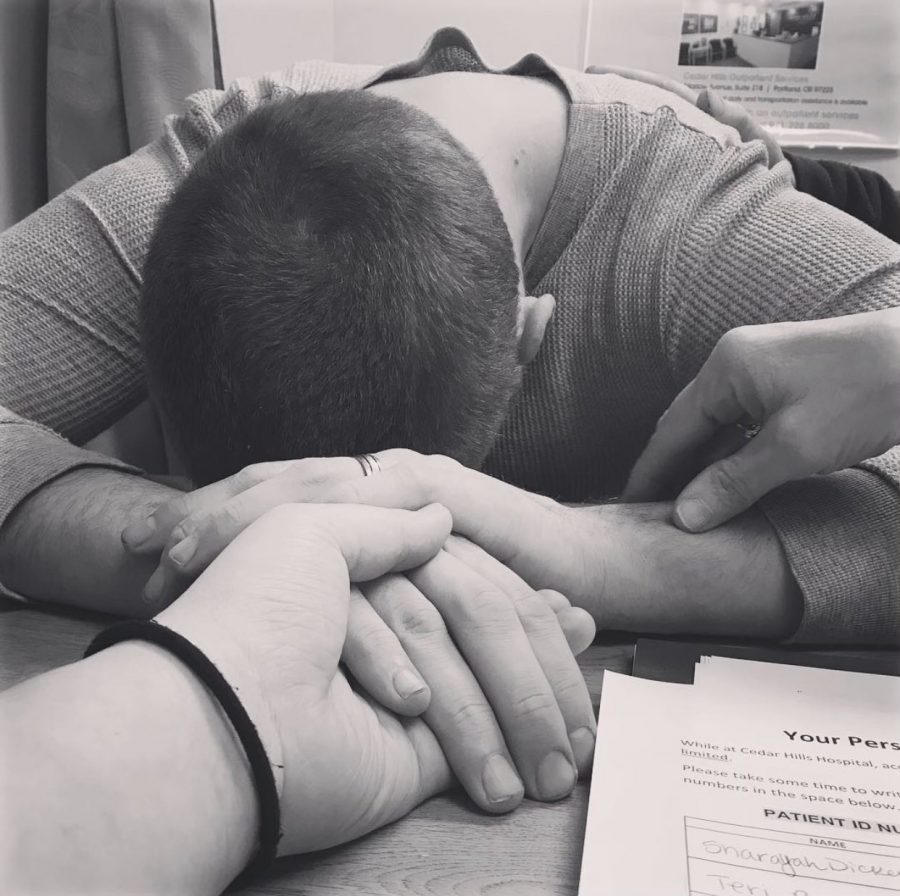Trigger Warning: Police violence, hallucinations, psychiatry
“GET OUT!”
Richie screamed with rage, his chest heaving, eyes filled with fury and fear.
I was scared. I’d never seen him like this.
He is 6 feet, four inches tall and 250 pounds. I couldn’t really talk him down.
I wasn’t scared of him. I was scared for him. He wasn’t screaming at me.
I followed his line of vision – he was screaming across the room, at the corner.
To me, the corner was empty.
To him, it contained the figure of one of his most abusive hallucinations – a man in a suit. The man had pale skin, glowing yellow eyes, slicked back hair, and words so vile that even years later he wont repeat them.
“LEAVE ME ALONE!”
…Another outburst of terror. It was then that I knew this was more than we could handle.
* * *
Convincing someone to get help for their mental health can be a difficult task, especially for the more stigmatized disorders (borderline personality disorder, bipolar disorder, and schizophrenia.) There are many reasons why – too many in fact.
The journey to mental health care is filled with obstacles. The more I poured myself into researching mental illness for my own family, the more it became clear. On this journey to get help for my partner, Richie, I came face to face with the stark realities of mental health care in our country.
If mental health care is nearly inaccessible for white people, the deep racism in the healthcare system as a whole abuses Black people and weaponizes psychiatry against them.
Andre Gladen… As I read the news article, my heart pounded and my chest felt like it was about to cave in. It was after Richie’s 6th psych ward trip in a period of 2 years. On a drizzly day in January, Andre Gladen was taken to Portland Adventist Emergency Room during an episode of psychosis. He later found himself on a nearby resident’s front porch, knocking at his door persistently and seeking shelter. He was paranoid, scared, and clearly unwell – dressed in a hospital gown and wearing only one shoe.
“…I’m legally blind and there’s someone standing on the corner in a white hoodie with a gun, and he’s coming after me to shoot me and kill me and you,” Gladen told the man, according to the transcript.
* * *
The difference between your imagination and psychosis is that psychosis actually feels real. It’s not just visual or auditory. All of your senses can be affected. Richie once had to ask a co-worker if his wrists were okay, because to him, they looked and felt like they were slashed. Many times, he believed our house was on fire – he could see, hear, smell, and feel the heat.
A mental health crisis for someone with psychosis is a truly terrifying experience… one that merits grace and empathetic care.
* * *
Earlier that same day, law enforcement officers took Andre to the emergency room for possible hypothermia. He had a long history of mental illness and had already been displaying signs of psychosis when police encountered him. They did not share this with the doctors, who noticed the mental health issues but failed to properly attribute them, believing him to be there for seizure related issues. They released him after prescribing anti-epileptic medication.
So by the time Andre arrived at the resident’s front door that day, he had already been in contact with law enforcement and care providers. The resident, uninformed and unable to identify Andre’s crisis, called the police.
While the details are contested, the introduction of an armed police officer did far more harm than good. The resident himself became agitated, arming himself with a club and making threats towards Andre – who was still in the throes of psychosis, frightened and believing his life was in danger.
After failing to de-escalate the situation, Portland Police Officer Consider Vosu shot Andre 2 times.
On January 6th, 2019 Andre Gladen’s fate was decided on the floor in a stranger’s home, and he succumbed to his wounds at the hospital.
It’s really hard to think about the last hours of his life.
Was Andre as terrified of the man in the white hoodie as my husband is of the man in the suit?
I do not know the details of Andre’s life, or the specific ways that our system failed him prior to that day. But I can tell you that Black therapists only make up 2% of providers based on the 2017 demographics of the American Psychological Association. That matters significantly.
Behavioral stereotypes of Black people are pervasive and incredibly damaging to the process of accessing care. Is she just angry and dramatic or actually dealing with OCD or anxiety? Is he really clinically paranoid, or does he have good reason to be hypervigilant? Black people are offered medication and therapy at lower rates than their white counterparts – 8.7% of Black adults received mental health services compared to 18.6% of white adults.
There are layers upon layers of inequality and racism throughout our system. These are just a few examples. Fixing this requires a comprehensive approach.
Everyone deserves access to adequate treatment, young or old, Black or white, rich or poor, citizen or not – but we also owe a specific debt of care and resources to Black communities. Since the founding of this country, Black people have endured and continue to endure unconscionable abuse, trauma, and torture. The impact of systemic racism and injustice has devastating effects on mental health and overall quality of life.
Black people deserve a better level of care and we cannot have a community where we all thrive until we tear the system apart and root out the racism, ableism, classism, xenophobia, and stigma. That means we all have to engage and decolonize the very concept of mental health.
I hope you’ll join us as we continue the conversation about how to do that. Today, May 1st, begins Mental Health Awareness Month. Going forward, We Out Here Magazine will be featuring more articles and stories about mental health and we would love to hear from you! What have your experiences been? What do you wish people knew about mental health? Drop us a line.
Printable Peer-sourced Crisis Zine


